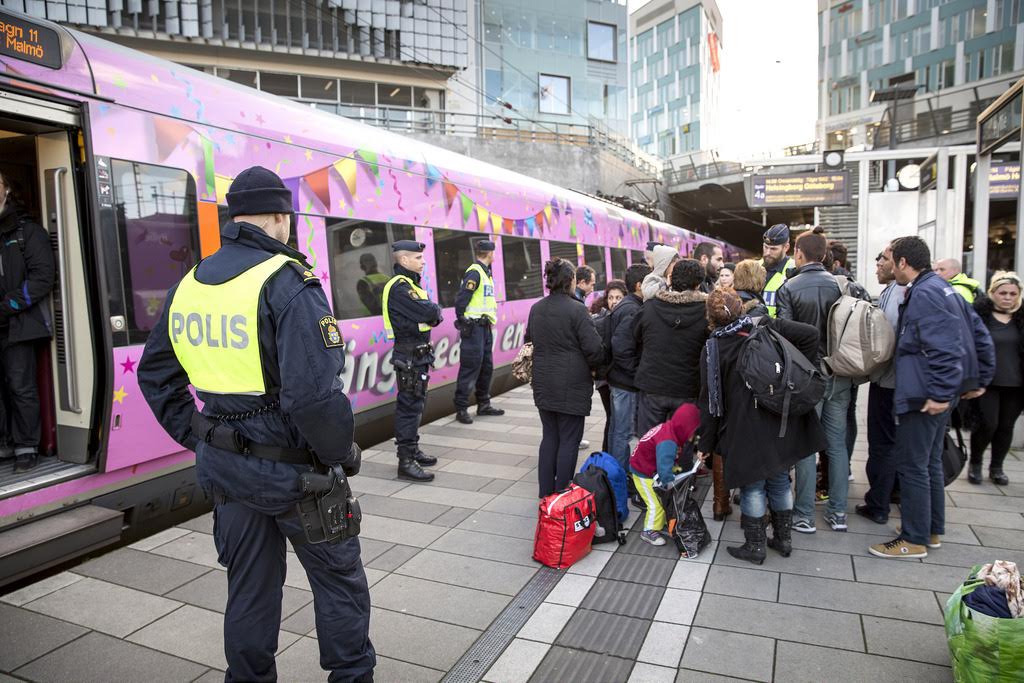Sweden has in just over six months moved from taking in the highest number of refugees per capita to practically closing its borders. This turn was not unexpected to many international commenters, claiming that this was the inevitable result of the country’s generous asylum policies. However, as it turns out, Sweden closed its borders by choice – not because it actually had to.
In early October last year an eerie notification chimed in smartphones throughout Sweden. The country, until this point known for its generous asylum policies, was to put an end to that. At the time it was only stated that there would be minor reforms of the asylum system. But it was only a matter of weeks until the border police stood on docks and platforms all over the south of Sweden, the free movement of the EU crunching under their boots, hunting everyone without the right documentation. This June, just weeks ago, an even stricter law was passed, practically granting politicians on the left and right the ‘refugee pause’ they have begged for.
For some commenters – both in Sweden and internationally – this was not unexpected. ‘Too generous for its own good?, Bloomberg asked rhetorically. It was seen as obvious that such high amounts of incoming refugees was a ticking bomb, and a collapse was inevitable. Populists throughout the world made many cheap political points – not at least on the myths of burning suburbs and the alleged rape wave (neither of them bearing much truth). Sweden seemed to confirm exactly what they had said all along; taking in more than a handful of refugees was foolish.
Is this the truth? Certainly not. Firstly, there is not much basis for the narrative of Sweden being in a state of mayhem. That not to say that the refugee wave was well organised and smooth; at one point in time, there were people sleeping outside the a Migration Board office in Malmö, major railway stations were in a state of chaos, and there are still not nearly enough flats to provide the refugees with housing. However, this is hardly enough to constitute a ‘systemic collapse’, as many Swedish populists like to speak of. The taxes have been raised, but mainly due to ideological reasons, following the leftist side winning the 2014 general election.
Does it mean that Sweden was well equipped to take in large amounts of refugees? No, it does not. There is an acute housing crisis, the queues for necessary medical treatment or surgery is often months long, and there are not nearly enough schools and nurseries. The unemployment amongst immigrants is unacceptably high, it taking a median of seven years from the arrival to Sweden to get a job. All these problems did, however, precede the refugee wave by years or decades. The reason for these problems is government regulation and red tape. It is expensive to hire employees (Sweden has a de facto minimum wage of 1400 Euros per month), and an inflexible employment code has led to it being far too difficult to terminate someone’s employment even in a recession. Flats are not let on the free market, but on a heavily regulated one, the regulation of the rents leading to an extremely low supply of apartments in relation to demand. Sweden’s problem is not – and has never been – immigration. It is regulation.
The autumn of 2015, Sweden was faced with a choice: start reforming, or prepare to close the border. To Swedish politicians in both government and opposition, maintaining the ‘Swedish model’ was clearly more important than to save lives (or, rather, letting people save their own lives). The lesson from Sweden is not that accepting high numbers of refugees will land a country in disaster. The lesson from Sweden is that a bureaucratic, inflexible welfare state of year model 1945 is inept to save those who really need saving. The lesson is that we should not accept that we cannot save lives; the lesson is that liberals ought to fight over-regulation and red tape. Maintaining systems can never be more important than human lives.
Simon Härnqvist is a student and chairman of the local chapter of the Swedish Liberal Youth in Malmö.

